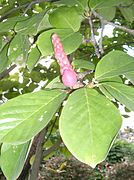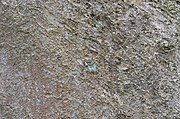Magnolia denudata
| Magnolia denudata | |
|---|---|

| |
| Scientific classification | |
| Kingdom: | Plantae |
| Clade: | Tracheophytes |
| Clade: | Angiosperms |
| Clade: | Magnoliids |
| Order: | Magnoliales |
| Family: | Magnoliaceae |
| Genus: | Magnolia |
| Subgenus: | Magnolia subg. Yulania |
| Section: | Magnolia sect. Yulania |
| Subsection: | Magnolia subsect. Yulania |
| Species: | M. denudata
|
| Binomial name | |
| Magnolia denudata | |
| Synonyms[1] | |
| |
Magnolia denudata, the lilytree[2] or Yulan magnolia (simplified Chinese: 玉兰花; traditional Chinese: 玉蘭花; pinyin: yùlánhuā; lit. 'jade orchid/lily'), is native to central and eastern China.[3] It has been cultivated in Chinese Buddhist temple gardens since 600 AD. Its flowers were regarded as a symbol of purity in the Tang dynasty and it was planted in the grounds of the emperor's palace. It is the official city flower of Shanghai.
Description
[edit]Magnolia denudata is a rather low, rounded, thickly branched, and coarse-textured tree to 30 feet (9.1 m) tall. The leaves are ovate, bright green, 15 cm long and 8 cm wide. The bark is a coarse, dark gray. The 10–16 cm white flowers that emerge from early to late spring, while beautiful and thick with a citrus-lemon fragrance, are prone to browning if subjected to frost.
Cultivation
[edit]Magnolia denudata is used as an ornamental tree in gardens. It is similar to other magnolias in that it likes rich, moist soil and should be planted in a location where it is protected from elemental extremes. This plant has gained the Royal Horticultural Society's Award of Garden Merit.[4]
Gallery
[edit]-
View of mature Magnolia denudata
- Botanical Park, Opatija, Croatia -
Leaves and fruit
-
Bark
-
Magnolia denudata flower
-
M. × soulangeana: hybrid of M. denudata & M. liliiflora
References
[edit]- ^ The Plant List: A Working List of All Plant Species, retrieved 29 May 2016
- ^ NRCS. "Magnolia denudata". PLANTS Database. United States Department of Agriculture (USDA). Retrieved 28 June 2015.
- ^ Nianhe Xia, Yuhu Liu & Hans P. Nooteboom. "Yulania denudata". Flora of China. Missouri Botanical Garden, St. Louis, MO & Harvard University Herbaria, Cambridge, Massachusetts. Retrieved 2 May 2013.
- ^ "Magnolia denudata". Royal Horticultural Society. 2017. Retrieved 2017-01-24.





